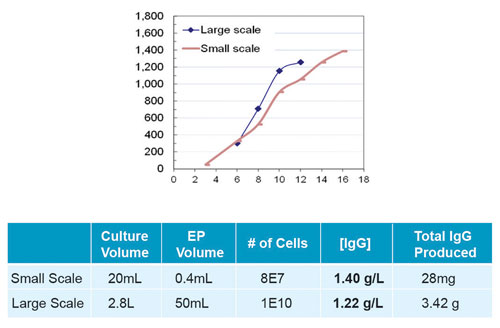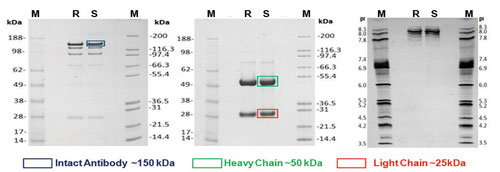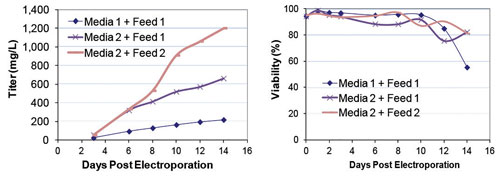June 15, 2014 (Vol. 34, No. 12)
Using CHO Cell Transient Gene Expression via Flow Electroporation
In recent years researchers have turned to transient gene expression (TGE) as an alternative to CHO stable cell-line production for early-stage antibody development.
There are variety of CHO cell transient transfection platforms, including engineered CHO cells, unique expression constructs, specialized reagents, and proprietary technologies. These systems as well as highly optimized protocols for lipids and polyethylenimine (PEI) have varying levels of reproducibility, scalability, and cost effectiveness, and in general produce antibody titers from 10 to 100 mg/L for a typical IgG.
These systems generally have even lower expression levels for difficult-to-express molecules such as bi-specific antibodies.
A flow electroporation technology available from MaxCyte has been shown to scale from milligram to multigram quantities of CHO antibodies without requiring specific expression constructs, engineered CHO cell lines, specialized reagents, or customized culture media. Secreted antibody titers are routinely greater than 400 mg/L and can exceed 1 g/L.
MaxCyte offers two benchtop systems: the MaxCyte STX® Scalable Transfection System and the MaxCyte VLX® Large Scale Transfection System. This technology has the capacity to transfect from 5E5 cells in seconds up to 2E11 cells in less than 30 minutes and has been used to transfect a variety of adherent and suspension CHO cell lines.
Scalable Antibody Production
Large-scale transfection studies demonstrate the ability of flow electroporation to rapidly produce grams of antibody using CHO TGE (Figure 1). Antibody titers of greater than 1.2 g/L were detected 12 days following transfection of 1E10 CHO-S cells using post-transfection culture conditions optimized for antibody productivity. Greater than 3 grams of antibody were produced from less than 3 liters of CHO culture.
Comparison studies of small- and large-scale electroporation illustrate the consistent and reproducible performance of flow electroporation (Figure 1). These studies also highlight the ability to scale up transfection without the need for further optimization.
Comparable cell viabilities and antibody titers were observed upon small- and large-scale transfection using the same electroporation parameters and general cell-handling methods. Reproducible and scalable, these transfections achieved titers greater than 1.2 g/L during the 14-day study.

Figure 1. High-titer antibody production maintained upon scale up. 1E10 CHO cells transfected using a single electroporation run yielded >3 grams of antibody from a 2.8 L culture. The MaxCyte VLX has the capacity to transfect 2E11 cells, which would equate to the production of over 50 grams of antibody from a single 30-minute transient transfection.
In another study, antibodies produced via MaxCyte transient transfection were characterized and compared to those produced by a stably transfected cell line (Figure 2). CHO cells were transiently transfected with an antibody expression plasmid, and secreted antibody samples were collected for analysis via electrophoresis.
The same antibody produced via a stable CHO cell line was used as a reference during analysis. Similar to previous reports, no differences between transiently and stably produced antibodies from CHO cells are observed when examined via reducing and nonreducing SDS-PAGE and isoelectric focusing.
Significant efforts have been made to increase CHO cell antibody productivity from both transient and stable expression systems. A range of factors have been identified that affect productivity including the use of specific CHO cell lines and various cell culture parameters such as cell density, feeding conditions, media additives, and culture temperature.
A variety of post-transfection parameters were examined, and the combination of a hypothermic temperature shift, the addition of sodium butyrate, and nutrient feed was found to significantly improve antibody titers achieving levels greater than 1.2 g/L (Figure 3).

Figure 2. Similarity of antibodies produced from stably and transiently transfected CHO cells. CHO suspension cells were transfected by static electroporation with a plasmid encoding IgG heavy and light chain sequences. Secreted antibodies from electroporated cells (S) and a reference stable cell line (R) were examined by reducing and nonreducing SDS-PAGE and isoelectric focusing. Data courtesy of NovImmune.
Media Composition and Feed Strategy
Cell growth, nutrient depletion, and secreted protein titers are interrelated and are influenced by media formulation. To examine these effects, CHO cells were transfected, resuspended in one of two media, and cultured using one of two feed strategies. Overall, it was found that both choice of media and feed strategy significantly affected antibody production (Figure 3).
The second media formulation led to antibody titers from three to six times higher than the first media formulation, depending on the feeding strategy used. The variant feed strategy in which nutrients were replenished more frequently generated antibody titers approximately twice those of less frequently fed cultures using media No. 2. By optimizing both the media formulation and the feed strategy resulted in an antibody titer of 1.2 g/L.
Recently, researchers have begun looking to antibody production by CHO stable pools to bridge the gap between antibody development and biomanufacturing. In addition to its use for TGE, flow electroporation is an ideal method of rapidly creating stable pools as well as generating high-yield stable cell clones.

Figure 3. Improved higher antibody titers by optimizing media composition and feeding schedule. 8E7 CHO-S cells were resuspended at 2E8 cells/mL and transiently transfected with a human antibody expression plasmid (2 µg DNA/1E6 cells) via static electroporation. Post electroporation cells were seeded at 5.6E6 cells/mL in Media 1 or Media 2 and fed on two different schedules. Antibody titers were determined on days 3–14 post electroporation using an ELISA.
Stable Cell-Line Generation
CHO cells were transfected using MaxCyte electroporation to create a stable pool from which stable cell lines were generated by limited dilution cloning. Within six weeks of the initial transient transfection, approximately 500 CHO cell clones were generated and screened. Clone 17 was identified as a top performer with a final antibody titer of 3.4 grams/L after a 21-day production period.
The results presented show that the MaxCyte technology facilitates the identification of quality candidates for preclinical studies while simultaneously streamlining the creation of high-yield stable CHO cell lines for clinical-grade biomanufacturing.
Flow electroporation is a proven means of rapid, high-performance CHO cell transient transfection. High-transfection efficiencies and cell viabilities enable secreted antibody titers that can exceed 1 g/L with post transfection optimization. Separately or in parallel, the same process can be used to generate stable pools with subsequent selection of high-producing clones.
Weili Wang, Ph.D., is principal scientist, protein production, James Brady, Ph.D., is director of technical applications, Madhusudan Peshwa, Ph.D., is executive vp of cellular therapies, and Karen Donato, Ph.D., is executive vp of global business development and marketing, all at MaxCyte. Krista Steger, Ph.D., is founder and president of Forge4ward. For more information contact Meg Duskin ([email protected]).



